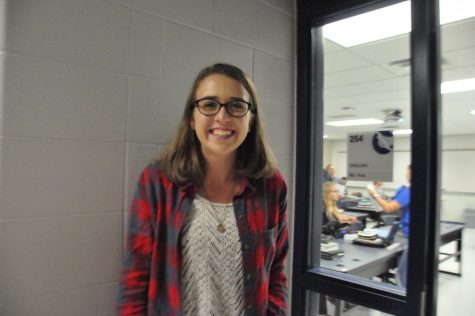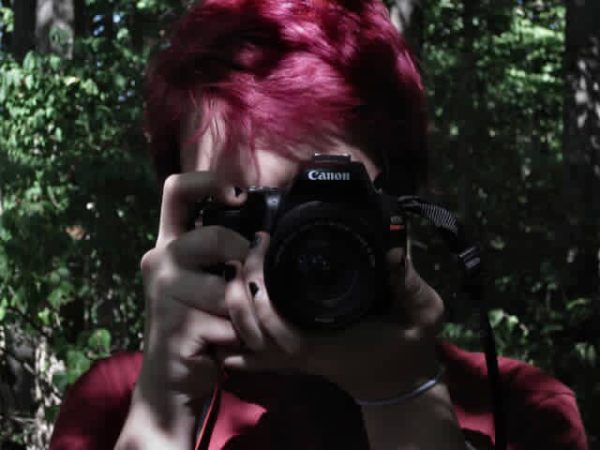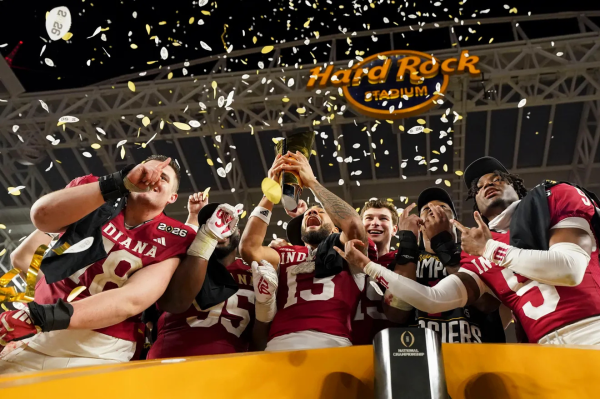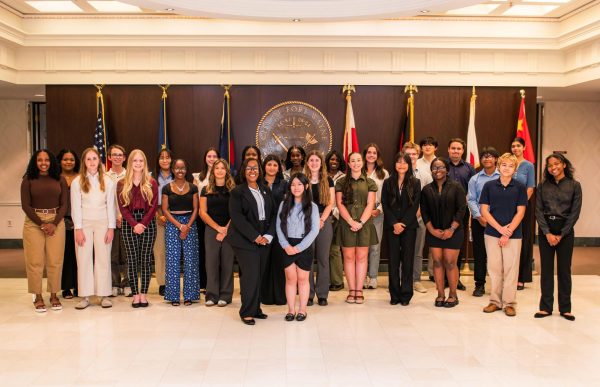Senior internships guide students into real world
High school is supposed to be a time to figure out what the next stage of your life entails and what your passions are, but how can students be expected to do that without exposure to different experiences? Sure, there are classes that teach the skills necessary to succeed in that career, but is that all that matters?
Students may be misinformed about what a certain career means or thought they could handle a desk job but realized they need to move around. A student may not enjoy the atmosphere of their chosen career field.
One of the most popular perks of senior year is the opportunity for students to choose an internship in place of two or three classes in their schedule. There are three different programs a student can do this through–Cadet Teaching with Mrs. Renee Sigmon and Mrs. Liz Scare, Health Professions with Mr. Steve Lubbehusen, or Carroll Community Link with Mr. Ryan Taylor and Mr. Ray Wardell.
Cadet Teaching is for prospective teachers or administrators, Health Professions is for future healthcare professionals and Carroll Community Link is for everything in between.
For the Carroll Community Link program, Mr. Taylor became the internship provider in 2002 and is starting his 18th year as the internship coordinator, while Mr. Wardell has been advising the program for four years.
“The purpose of the program is to help students create a link between the school and the world of work,” said Mr. Taylor. “In doing so, this will help prepare the student for the transition into the workforce.”
Since spots in the program are limited, students apply for it at the end of the first semester of their junior year. They will then be told if they were accepted early second semester when it’s time to choose classes for their senior year. From then, they will have a few months to search for and confirm an internship location, where they will begin working at regularly mid-August of their senior year.
In order to gain credit for the course, students attend their internship at least three days a week. They also must get an average of ten hours worked per week, adding up to at least 150 hours by the end of each semester.
In addition to the work they do at their internship company, students are also expected to complete weekly journals or enrichment activities, and occasionally a project such as a report on their company’s safety or a flyer describing their company. At the end of each semester, students still have to take a final of some sorts in the form of a project.
Although the assignments may be where the grade comes from, the real purpose of the program is to prepare students for their future.
“[My favorite part is] helping students to see the opportunities that are available to them. I like seeing students gain the passion and excitement for the next step in their lives and for them to see what their life may be like,” said Mr. Taylor.
Through an internship, students are able to gain knowledge about various careers they’re interested in, gain confidence in their decision-making skills and gain contacts that can guide and help with their future.
This program pushes seniors beyond the normalcy and redundancy of a seven-period school day that they have faced for three years prior. It provides them with more freedom and “real-world experience” that high school just can’t provide.
“I would recommend this program to anyone wanting to determine if a certain career is what they want to pursue in college and in the future. An internship really helps students identify their interests in a particular career,” said Mr. Wardell.
One senior who benefited from the program is Alex Karber, at Design Collaborative, an engineering company located in downtown Fort Wayne.
“I don’t know how, but I stumbled on what, in my opinion, is the best company anyone interested in design, engineering and architecture could ask for,” said Alex.
Alex said he usually performs the stereotypical intern errands, doing whatever he is needed to do at the time. He has even been able to take part in some actual engineering projects, like designing a hospital in the South Bend area.
But when he doesn’t have a task to do, he goes around and talks to different employees about what they’re doing. Through talking to the different employees and experiencing the culture first hand, he’s been able to make better decisions about his future career. He’s found out what he likes and dislikes about engineering and has decided if it’s really where he sees himself long-term.
“I’m glad that I made that decision and I am beginning to understand what interests me as a future career; something I would still be in the dark about if I would not have done an internship,” said Alex.
Although Alex may have found his future career through his company, not everyone is going to find that same kind of success. Sometimes, an internship will teach students that their prospective career is not what they thought it would be and that their life is being called in a different direction.
One student who found this is Zach Kern, who was interning in the guidance department at Hickory Center through the Cadet Teaching program when he realized he no longer plans to major in education.
“Senior classes should be selected heavily based upon your plans for education, but throughout my experience, I realized this major simply didn’t fit me,” said Zach. “This is nothing against the Cadet Teaching program itself or my mentor teachers, I just felt pulled to study a different major instead.”
At face value, this may seem like a small decision, but in the long run, it’s a decision that saved Zach thousands of dollars and years of time that would have been invested into studying something that he never truly loved.
Although he no longer plans to major in education, Zach did say he will continue Cadet Teaching second semester in order to gain college credit. Next year he plans to major in business and marketing instead.
If he had the option to switch and still gain college credit, he would intern with a business or marketing company in the area. He also said he would have liked to intern at Pathway Community Church with the worship team because music is one of his hobbies.
“It would be a cool experience to see what business is like, but I’m not complaining about what I’ve gotten,” said Zach.
Although an internship may seem like it solves all the problems seniors face, it doesn’t. Senior Kiana Thurber has been participating in the program all year, but still doesn’t know what she wants to do.
“I wanted to be able to get experience in many different aspects of a business for experience before I go to college, I feel that the more experience I have, the more I will be ready for a degree in college,” said Kiana.
During the first semester, Kiana worked at Midwest Eye Consultants as a technician, checking people’s eyes for various conditions such as color blindness and glaucoma. She said that she had a very positive experience at Midwest Eye Consultants, but still feels that she needs more experience in other areas. In the second semester, she will be interning at her church, Crossbridge Community Church.
“I’m doing an internship with my worship pastor to learn more about music, which is a hobby of mine,” said Kiana. “This is not a career path that I’m considering, but it could lead me to more opportunities in the future.”
Whether the program leads a student towards their future career, in the general direction of what they like or toward a career they never what, the internship program is a valuable experience for seniors. It pulls them out of the “Carroll bubble” that is easy to get stuck in and shows them what life after high school could be like.
“They [students] are able to see if they have the passion for that career every day and know if they will love it in the future,” said Mr. Taylor. “They are also able to start gaining independence and learn how to juggle an internship, school and sometimes extracurriculars and a job.”






